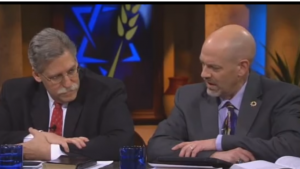Phil Johnson, Executive Director of Grace to You, weighs in on the White-Brown controversy. He writes:
It seems this week’s episode of “Too Wretched for Radio” unleashed a minor Tweetstorm. A few points have been raised that apparently still need clarification:
- It does not trouble me that James White and Michael Brown are friends. As far as their personal relationship is concerned, it surely holds some potential for good. Indeed, Dr. Brown could use more friends whose theological convictions are rooted in Scripture rather than the latest “fresh word” from the mouths of demonstrably false prophets in Redding, CA; Sydney, Australia; Kansas City; TBN; the NAR; or some other nest of charismatic extremism.
- I deplore hyper-separatism almost as much as I hate ecumenism. I don’t tell my friends whom they should or shouldn’t be friends with. Our Lord was known as “a friend of tax collectors and sinners” (Luke 7:34). And He didn’t automatically shun even teachers of religion who were doctrinally at odds with Him. When “one of the Pharisees asked him to eat with him . . . he went into the Pharisee’s house and took his place at the table” (v. 36). On “The Dividing Line” last week, Dr. White stated that critics have been telling him, “You have to separate yourself from anybody that you have disagreements with when it comes to theology.” He expressly attributed that position to his more moderate, reasonable critics (“not . . . the unhinged folks.”) I personally have not heard anyone (including the unhinged folks) make such a statement with regard to the Brown/White relationship. But I am of course aware that there are hyper-separatists out there who seem to relish conflict and treat everydisagreement as an excuse to fire off anathemas. That’s not my position. Some of the richest, most edifying friendships I’ve ever had transcend denominational and theological boundaries. My own circle of friends is wide enough to include both stodgy, formal Anglicans and exuberant, hand-waving Pentecostals. I even have some friends who make no profession of faith at all.
- On the other hand, we are forbidden by Scripture to partner with or promote someone who comes in Christ’s name and perverts or rewrites the gospel (Galatians 1:8-9; 2 John 7-11).My complaint about Michael Brown is that he routinely flouts that principle. Not that he himself overtly proclaims a twisted gospel; he seems to know better than that. But he partners with and aggressively promotes prosperity-gospel preachers, purveyors of false prophecies, and charismatic extremists of every variety, whether they actually have a credible gospel testimony or not.
Brown’s plea is twofold: First, he says he knows these people personally, and they are wonderful, tenderhearted, lovable, well-meaning Christian people. Second, he doesn’t know enough about their teaching or their activities to judge them guilty of corrupting the gospel or prophesying falsely. He doesn’t have time to investigate them thoroughly, and it’s unreasonable for his critics to assume he knows what they teach. The two halves of his self-defense thus cancel each other out.

- It’s impossible to escape the conclusion that Dr. Brown is not a credible authority on charismatic issues—especially the question of who is orthodox and who is not. He has been in leadership in the charismatic movement since at least the mid-1990s. He’s been a champion or a defender of every aberrant doctrine or practice featured in the pages of Charisma magazine. He scolds critics of the charismatic movement for not really knowing what’s going on inside. And yet when pressed with specific examples of charismatic extremism or heresy, he invariably pleads ignorance. He says he’s not familiar with the New Apostolic Reformation. He claims to have been unaware of any heresy, fakery, or false prophecy stemming from Benny Hinn prior to 2014. And he claims it is unreasonable for critics to demand that he watch videos,
 study the teaching, read published material, and give account for the various heresies and abuses of people whom he has partnered with.
study the teaching, read published material, and give account for the various heresies and abuses of people whom he has partnered with. - One of my chief concerns is that Dr. Brown seems to be using his relationship with James White to deflect legitimate and important criticisms. I love James White and have the greatest respect for his abilities as an apologist and teacher. But I do think his public deference to Dr. Brown has enabled and encouraged efforts by Dr. Brown to evade accountability for his partnership with (and promotion of) some of the grossest truth-corrupters and charlatans who are troubling the church today.
